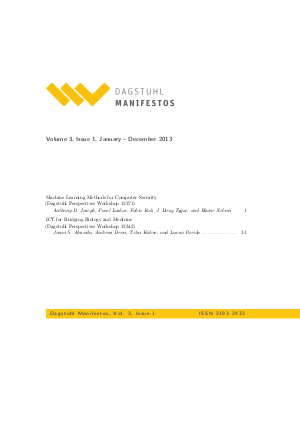Dagstuhl Manifestos, Volume 3, Issue 1
-
Part of:
Volume:
Dagstuhl Manifestos, Volume 3
Journal: Dagstuhl Manifestos (DagMan)

Publication Details
- published at: 2013-11-29
- Publisher: Schloss Dagstuhl – Leibniz-Zentrum für Informatik
- DBLP: db/journals/dagstuhl-manifestos/dagstuhl-manifestos3
Access Numbers
- Detailed Access Statistics available here
-
Total Document Accesses (updated on a weekly basis):
0PDF Downloads
Documents
Dagstuhl Manifestos, Volume 3, Issue 1, January - December 2013, Complete Issue
Abstract
Cite as
Dagstuhl Manifestos, Volume 3, Issue 1, pp. 1-52, Schloss Dagstuhl – Leibniz-Zentrum für Informatik (2014)
Copy BibTex To Clipboard
@Article{DagMan.3.1,
title = {{Dagstuhl Manifestos, Volume 3, Issue 1, January - December 2013, Complete Issue}},
pages = {1--52},
journal = {Dagstuhl Manifestos},
ISSN = {2193-2433},
year = {2014},
volume = {3},
number = {1},
publisher = {Schloss Dagstuhl -- Leibniz-Zentrum f{\"u}r Informatik},
address = {Dagstuhl, Germany},
URL = {https://drops.dagstuhl.de/entities/document/10.4230/DagMan.3.1},
URN = {urn:nbn:de:0030-drops-47909},
doi = {10.4230/DagMan.3.1},
annote = {Keywords: Dagstuhl Manifestos, Volume 3, Issue 1, January - December 2013, Complete Issue}
}
Dagstuhl Manifestos, Table of Contents, Volume 3, Issue 1, 2013
Abstract
Cite as
Dagstuhl Manifestos, Volume 3, Issue 1, pp. i-ii, Schloss Dagstuhl – Leibniz-Zentrum für Informatik (2014)
Copy BibTex To Clipboard
@Article{DagMan.3.1.i,
title = {{Dagstuhl Manifestos, Table of Contents, Volume 3, Issue 1, 2013}},
pages = {i--ii},
journal = {Dagstuhl Manifestos},
ISSN = {2193-2433},
year = {2014},
volume = {3},
number = {1},
publisher = {Schloss Dagstuhl -- Leibniz-Zentrum f{\"u}r Informatik},
address = {Dagstuhl, Germany},
URL = {https://drops.dagstuhl.de/entities/document/10.4230/DagMan.3.1.i},
URN = {urn:nbn:de:0030-drops-47896},
doi = {10.4230/DagMan.3.1.i},
annote = {Keywords: Dagstuhl Manifestos, Table of Contents, Volume 3, Issue 1, 2013}
}
Machine Learning Methods for Computer Security (Dagstuhl Perspectives Workshop 12371)
Abstract
Cite as
Anthony D. Joseph, Pavel Laskov, Fabio Roli, J. Doug Tygar, and Blaine Nelson. Machine Learning Methods for Computer Security (Dagstuhl Perspectives Workshop 12371). In Dagstuhl Manifestos, Volume 3, Issue 1, pp. 1-30, Schloss Dagstuhl – Leibniz-Zentrum für Informatik (2013)
Copy BibTex To Clipboard
@Article{joseph_et_al:DagMan.3.1.1,
author = {Joseph, Anthony D. and Laskov, Pavel and Roli, Fabio and Tygar, J. Doug and Nelson, Blaine},
title = {{Machine Learning Methods for Computer Security (Dagstuhl Perspectives Workshop 12371)}},
pages = {1--30},
journal = {Dagstuhl Manifestos},
ISSN = {2193-2433},
year = {2013},
volume = {3},
number = {1},
editor = {Joseph, Anthony D. and Laskov, Pavel and Roli, Fabio and Tygar, J. Doug and Nelson, Blaine},
publisher = {Schloss Dagstuhl -- Leibniz-Zentrum f{\"u}r Informatik},
address = {Dagstuhl, Germany},
URL = {https://drops.dagstuhl.de/entities/document/10.4230/DagMan.3.1.1},
URN = {urn:nbn:de:0030-drops-43569},
doi = {10.4230/DagMan.3.1.1},
annote = {Keywords: Adversarial Learning, Computer Security, Robust Statistical Learning, Online Learning with Experts, Game Theory, Learning Theory}
}
ICT for Bridging Biology and Medicine (Dagstuhl Perspectives Workshop 13342)
Abstract
Cite as
Jonas S. Almeida, Andreas Dress, Titus Kühne, and Laxmi Parida. ICT for Bridging Biology and Medicine (Dagstuhl Perspectives Workshop 13342). In Dagstuhl Manifestos, Volume 3, Issue 1, pp. 31-50, Schloss Dagstuhl – Leibniz-Zentrum für Informatik (2014)
Copy BibTex To Clipboard
@Article{almeida_et_al:DagMan.3.1.31,
author = {Almeida, Jonas S. and Dress, Andreas and K\"{u}hne, Titus and Parida, Laxmi},
title = {{ICT for Bridging Biology and Medicine (Dagstuhl Perspectives Workshop 13342)}},
pages = {31--50},
journal = {Dagstuhl Manifestos},
ISSN = {2193-2433},
year = {2014},
volume = {3},
number = {1},
editor = {Almeida, Jonas S. and Dress, Andreas and K\"{u}hne, Titus and Parida, Laxmi},
publisher = {Schloss Dagstuhl -- Leibniz-Zentrum f{\"u}r Informatik},
address = {Dagstuhl, Germany},
URL = {https://drops.dagstuhl.de/entities/document/10.4230/DagMan.3.1.31},
URN = {urn:nbn:de:0030-drops-44292},
doi = {10.4230/DagMan.3.1.31},
annote = {Keywords: Systems medicine, health-care related information systems, biomedical workflow engines, medical cloud, patient participation, ICT literacy}
}